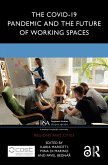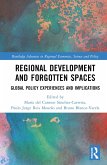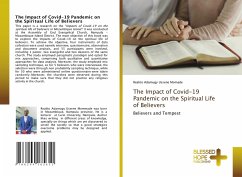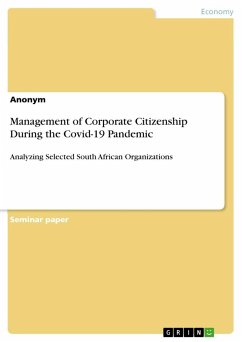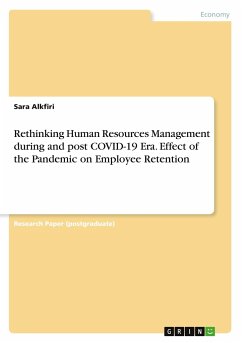The COVID-19 Pandemic and the Future of Working Spaces
Herausgeber: Mariotti, Ilaria; Bedná¿, Pavel; Di Marino, Mina
The COVID-19 Pandemic and the Future of Working Spaces
Herausgeber: Mariotti, Ilaria; Bedná¿, Pavel; Di Marino, Mina
- Broschiertes Buch
- Merkliste
- Auf die Merkliste
- Bewerten Bewerten
- Teilen
- Produkt teilen
- Produkterinnerung
- Produkterinnerung
This book presents a compendium of emerging and innovative studies on the proliferation of new working spaces, both formal and informal, such as co-working spaces, maker spaces, Fab labs, public libraries and coffeeshops, and their role during and post-Covid-19.
Andere Kunden interessierten sich auch für
![The COVID-19 Pandemic and the Future of Working Spaces The COVID-19 Pandemic and the Future of Working Spaces]() The COVID-19 Pandemic and the Future of Working Spaces180,99 €
The COVID-19 Pandemic and the Future of Working Spaces180,99 €![Regional Development and Forgotten Spaces Regional Development and Forgotten Spaces]() Regional Development and Forgotten Spaces180,99 €
Regional Development and Forgotten Spaces180,99 €![Cities Learning from a Pandemic Cities Learning from a Pandemic]() Cities Learning from a Pandemic58,99 €
Cities Learning from a Pandemic58,99 €![The Impact of Covid-19 Pandemic on the Spiritual Life of Believers The Impact of Covid-19 Pandemic on the Spiritual Life of Believers]() Realito Adamugy Ussene MomadeThe Impact of Covid-19 Pandemic on the Spiritual Life of Believers17,99 €
Realito Adamugy Ussene MomadeThe Impact of Covid-19 Pandemic on the Spiritual Life of Believers17,99 €![Management of Corporate Citizenship During the Covid-19 Pandemic Management of Corporate Citizenship During the Covid-19 Pandemic]() AnonymousManagement of Corporate Citizenship During the Covid-19 Pandemic17,95 €
AnonymousManagement of Corporate Citizenship During the Covid-19 Pandemic17,95 €![A Journey to Work from Home During Covid-19 Pandemic Lockdown - Will It Still Be Relevant After the Pandemic A Journey to Work from Home During Covid-19 Pandemic Lockdown - Will It Still Be Relevant After the Pandemic]() Sulaiman Baputey Ph. DA Journey to Work from Home During Covid-19 Pandemic Lockdown - Will It Still Be Relevant After the Pandemic15,99 €
Sulaiman Baputey Ph. DA Journey to Work from Home During Covid-19 Pandemic Lockdown - Will It Still Be Relevant After the Pandemic15,99 €![Rethinking Human Resources Management during and post COVID-19 Era. Effect of the Pandemic on Employee Retention Rethinking Human Resources Management during and post COVID-19 Era. Effect of the Pandemic on Employee Retention]() Sara AlkfiriRethinking Human Resources Management during and post COVID-19 Era. Effect of the Pandemic on Employee Retention15,95 €
Sara AlkfiriRethinking Human Resources Management during and post COVID-19 Era. Effect of the Pandemic on Employee Retention15,95 €-
-
-
This book presents a compendium of emerging and innovative studies on the proliferation of new working spaces, both formal and informal, such as co-working spaces, maker spaces, Fab labs, public libraries and coffeeshops, and their role during and post-Covid-19.
Produktdetails
- Produktdetails
- Verlag: Routledge
- Seitenzahl: 298
- Erscheinungstermin: 27. Mai 2024
- Englisch
- Abmessung: 234mm x 156mm x 16mm
- Gewicht: 456g
- ISBN-13: 9781032019574
- ISBN-10: 1032019573
- Artikelnr.: 70367820
- Herstellerkennzeichnung
- Libri GmbH
- Europaallee 1
- 36244 Bad Hersfeld
- gpsr@libri.de
- Verlag: Routledge
- Seitenzahl: 298
- Erscheinungstermin: 27. Mai 2024
- Englisch
- Abmessung: 234mm x 156mm x 16mm
- Gewicht: 456g
- ISBN-13: 9781032019574
- ISBN-10: 1032019573
- Artikelnr.: 70367820
- Herstellerkennzeichnung
- Libri GmbH
- Europaallee 1
- 36244 Bad Hersfeld
- gpsr@libri.de
Ilaria Mariotti is an associate professor of urban and regional economics in the Department of Architecture and Urban Studies at the Politecnico di Milano, Italy. Mina Di Marino is an associate professor in the Department of Urban and Regional Planning, Norwegian University of Life Sciences, Norway. Pavel Bedná¿ is an assistant professor and head of the Department of Regional Development, Public Sector Administration and Law, Faculty of Management and Economics, Tomas Bata University in Zlín, Czech Republic.
Introduction The Effects of the COVID-19 Pandemic on the Future of Working
Spaces PART 1 Socioeconomic Impacts of the COVID-19 pandemic on New Working
Spaces and New Development Scenarios 1. Coworking spaces and COVID-19:
Analysing the debate through Twitter 2. Changes in knowledge strategies
under the COVID-19 pandemic: A tale of European coworking spaces 3.
Independently operated coworking spaces and the effects of the COVID-19
pandemic 4. A Look into Beirut's Coworking Scene: Exploring the Pre- and
Post-pandemic Conditions 5. Community bonds in new working spaces of a
small town PART 2 The Role of New Working Spaces in Urban and Regional
Development and the Policy and Planning Debate During the COVID-19 Pandemic
6. New working spaces: policy perspectives before and after the COVID-19
pandemic 7. New working spaces in rural areas: designing a research agenda
for regional sovereignty in post- pandemic times 8. Digital nomads and
coworking spaces: reshaped perspectives? The Paris mega city-region after
COVID-19 9. Rural coworking spaces in the COVID-19 era: a window of
opportunity? 10. Presenting coworking spaces and chrono-urbanism as a
policy package for sustainable mobility in post-pandemic Malta PART 3 New
Working Spaces and the Work Lives of Coworkers and Remote Workers Under the
COVID-19 Pandemic 11. Virtual coworking and remote working: lessons and
perspectives on the COVID-19 impacts from Estonia and Norway 12. Coworkers
in the Netherlands in the post-pandemic 13. Coworking spaces and COVID-19:
A South-Korean perspective 14. Perspectives on the Dynamics of Third Spaces
15. Home, university, and other spaces: Where Finnish and Italian academics
did research prior to and during the COVID-19 pandemic 16. Women Empowering
Women? Challenges and opportunities of new female-oriented 17. Work-life
balance services in coworking spaces and the impact of COVID-19 Concluding
Remarks, Trends and Future Research on New Work Spaces
Spaces PART 1 Socioeconomic Impacts of the COVID-19 pandemic on New Working
Spaces and New Development Scenarios 1. Coworking spaces and COVID-19:
Analysing the debate through Twitter 2. Changes in knowledge strategies
under the COVID-19 pandemic: A tale of European coworking spaces 3.
Independently operated coworking spaces and the effects of the COVID-19
pandemic 4. A Look into Beirut's Coworking Scene: Exploring the Pre- and
Post-pandemic Conditions 5. Community bonds in new working spaces of a
small town PART 2 The Role of New Working Spaces in Urban and Regional
Development and the Policy and Planning Debate During the COVID-19 Pandemic
6. New working spaces: policy perspectives before and after the COVID-19
pandemic 7. New working spaces in rural areas: designing a research agenda
for regional sovereignty in post- pandemic times 8. Digital nomads and
coworking spaces: reshaped perspectives? The Paris mega city-region after
COVID-19 9. Rural coworking spaces in the COVID-19 era: a window of
opportunity? 10. Presenting coworking spaces and chrono-urbanism as a
policy package for sustainable mobility in post-pandemic Malta PART 3 New
Working Spaces and the Work Lives of Coworkers and Remote Workers Under the
COVID-19 Pandemic 11. Virtual coworking and remote working: lessons and
perspectives on the COVID-19 impacts from Estonia and Norway 12. Coworkers
in the Netherlands in the post-pandemic 13. Coworking spaces and COVID-19:
A South-Korean perspective 14. Perspectives on the Dynamics of Third Spaces
15. Home, university, and other spaces: Where Finnish and Italian academics
did research prior to and during the COVID-19 pandemic 16. Women Empowering
Women? Challenges and opportunities of new female-oriented 17. Work-life
balance services in coworking spaces and the impact of COVID-19 Concluding
Remarks, Trends and Future Research on New Work Spaces
Introduction The Effects of the COVID-19 Pandemic on the Future of Working
Spaces PART 1 Socioeconomic Impacts of the COVID-19 pandemic on New Working
Spaces and New Development Scenarios 1. Coworking spaces and COVID-19:
Analysing the debate through Twitter 2. Changes in knowledge strategies
under the COVID-19 pandemic: A tale of European coworking spaces 3.
Independently operated coworking spaces and the effects of the COVID-19
pandemic 4. A Look into Beirut's Coworking Scene: Exploring the Pre- and
Post-pandemic Conditions 5. Community bonds in new working spaces of a
small town PART 2 The Role of New Working Spaces in Urban and Regional
Development and the Policy and Planning Debate During the COVID-19 Pandemic
6. New working spaces: policy perspectives before and after the COVID-19
pandemic 7. New working spaces in rural areas: designing a research agenda
for regional sovereignty in post- pandemic times 8. Digital nomads and
coworking spaces: reshaped perspectives? The Paris mega city-region after
COVID-19 9. Rural coworking spaces in the COVID-19 era: a window of
opportunity? 10. Presenting coworking spaces and chrono-urbanism as a
policy package for sustainable mobility in post-pandemic Malta PART 3 New
Working Spaces and the Work Lives of Coworkers and Remote Workers Under the
COVID-19 Pandemic 11. Virtual coworking and remote working: lessons and
perspectives on the COVID-19 impacts from Estonia and Norway 12. Coworkers
in the Netherlands in the post-pandemic 13. Coworking spaces and COVID-19:
A South-Korean perspective 14. Perspectives on the Dynamics of Third Spaces
15. Home, university, and other spaces: Where Finnish and Italian academics
did research prior to and during the COVID-19 pandemic 16. Women Empowering
Women? Challenges and opportunities of new female-oriented 17. Work-life
balance services in coworking spaces and the impact of COVID-19 Concluding
Remarks, Trends and Future Research on New Work Spaces
Spaces PART 1 Socioeconomic Impacts of the COVID-19 pandemic on New Working
Spaces and New Development Scenarios 1. Coworking spaces and COVID-19:
Analysing the debate through Twitter 2. Changes in knowledge strategies
under the COVID-19 pandemic: A tale of European coworking spaces 3.
Independently operated coworking spaces and the effects of the COVID-19
pandemic 4. A Look into Beirut's Coworking Scene: Exploring the Pre- and
Post-pandemic Conditions 5. Community bonds in new working spaces of a
small town PART 2 The Role of New Working Spaces in Urban and Regional
Development and the Policy and Planning Debate During the COVID-19 Pandemic
6. New working spaces: policy perspectives before and after the COVID-19
pandemic 7. New working spaces in rural areas: designing a research agenda
for regional sovereignty in post- pandemic times 8. Digital nomads and
coworking spaces: reshaped perspectives? The Paris mega city-region after
COVID-19 9. Rural coworking spaces in the COVID-19 era: a window of
opportunity? 10. Presenting coworking spaces and chrono-urbanism as a
policy package for sustainable mobility in post-pandemic Malta PART 3 New
Working Spaces and the Work Lives of Coworkers and Remote Workers Under the
COVID-19 Pandemic 11. Virtual coworking and remote working: lessons and
perspectives on the COVID-19 impacts from Estonia and Norway 12. Coworkers
in the Netherlands in the post-pandemic 13. Coworking spaces and COVID-19:
A South-Korean perspective 14. Perspectives on the Dynamics of Third Spaces
15. Home, university, and other spaces: Where Finnish and Italian academics
did research prior to and during the COVID-19 pandemic 16. Women Empowering
Women? Challenges and opportunities of new female-oriented 17. Work-life
balance services in coworking spaces and the impact of COVID-19 Concluding
Remarks, Trends and Future Research on New Work Spaces



